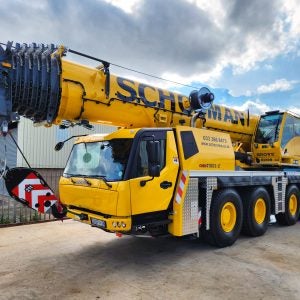UK highway authorities are finally recognising the mobile crane as a specific vehicle category.
Previously mobile cranes came under the general category of ‘engineering plant’ and, officially, were restricted to travelling at no more than 12mph (19km/h) on public highways. Now the UK government is rethinking how it categorises special vehicles in a revision of the Motor Vehicles (Authorisation of Special Types) General Order 1979.
The so-called STGO review is a government initiative to ensure that the highway infrastructure can withstand the traffic on it.
Under the review, mobile cranes are given a precise definition for the first time. A key criteria is a maximum 12.5t per axle loading – 500kg more than most other European Union countries allow, to enable mobile cranes in the UK to carry rigging and other necessary equipment on board and thus minimise road traffic. In countries where a 12t per axle limit is rigorously enforced, one or more support vehicles often have to accompany cranes.
Machines that meet the new definition of mobile crane will be allowed to travel on UK roads at 50mph (80km/h) on motorways, 45mph (72km/h) on dual carriageways, and 40mph (64km/h) on other roads (unless general speed restrictions apply).
Cranes unable to meet the 12.5t per axle limit will still be classified as ‘engineering plant’. According to the law, these will still only be allowed to travel at a maximum of 12mph, although dispensation is given for motorways. Police usually turn a blind eye to wheeled cranes travelling faster than this speed because the traffic disruption resulting from a mobile crane observing the speed restriction is a greater nuisance than one safely exceeding it.
A new requirement for mobile cranes under the proposals is that they should have a plate stating their gross vehicle weight, like heavy goods vehicles. A likely point of discussion during the consultation is whether the stated GVW should be the weight published by the crane manufacturer, or whether it should include a full tank of fuel, hydraulic oil, fly jibs, mats and other add-ons that the manufacturers don’t always include even though they are essential to the crane’s operation.
The STGO 2002 consultation draft is posted on the web at www.roads.dtlr.gov.uk/consult/stgo






